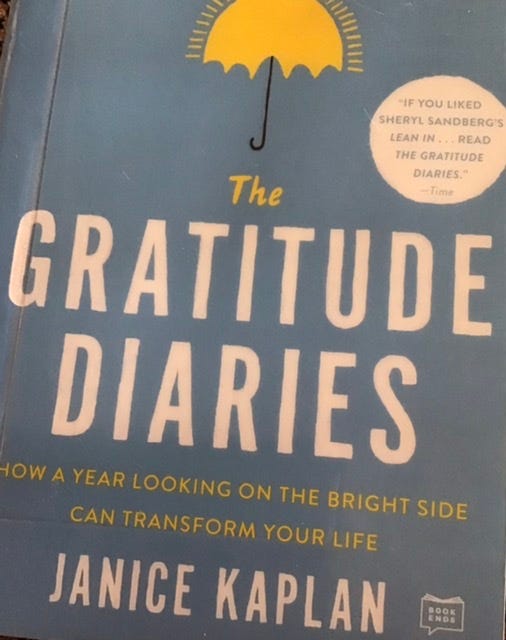You don’t have to call it a resolution
It’s just a different point of view that can change your life!

It’s 12/31 and time to shed the negatives of last year and move into a positive 2024!
I have only one resolution (so far), and it’s worth thinking about this even if you hate new year’s resolutions, and you can start any time.
It will likely be no surprise to anyone following me here that it’s been a crazy year, and I am grateful to be alive and well! My goal in 2024 is to become aware of those parts of my life I should be more grateful for, and then express that sentiment verbally or in writing.
I know this is nothing new; Oprah has been talking about it for years. But it’s easy to forget.
I first became very aware of just how grateful I should be when a good friend of mine, her name also Debra (we called each other Deb), became sick with an unusual cancer that eventually took her life in 2016. She was about my age, and it was heartbreaking to see her so thin and weak. Our daughters were friends, so it brought it home. A very sad time.
I remember visiting her in a NYC hospital when she was bedridden and fragile, but lucid. She asked where I got my dress because she liked it; it was nothing special to me, just a dress, but from her point of view, it might have meant much more. Hope maybe? I wondered if she knew she might never recover, and had trouble keeping my eyes dry.
On the train home, I prayed for her and gave thanks for my health. It eventually turned into a gratitude list, mainly basics that I still use often: Being able to get up in the morning, walk, see the sunrise, make and then enjoy a cup of coffee. Deb had little chance of doing these again; her prognosis was grim.
You would think saying goodbye that day would have changed my attitude forever, but not so. My recent cancer scare was a refresher. And then I came across a book, a New York Times bestseller, “The Gratitude Diaries: How a Year of Looking on the Bright Side Can Transform Your Life,” by Janice Kaplan (2015). I picked it up.
Sometimes a book crosses your path at the right time, and this was one of those.
Kaplan, a journalist and author, did research on gratitude for a story that evolved into the book. In it, she takes a different tack as she approaches gratitude with a specific focus on each chapter and an active engagement with becoming more grateful in the moment. She begins with this:
As I started to plot my year of living gratefully, I decided the number one topic that needed a more positive approach was my marriage.
You don’t have to be married to appreciate what she’s saying. In this chapter, she finds a reason to be grateful even on those occasions when she previously would have been critical (e.g., her husband is late). She reframes it. She’s not just listing what she’s grateful for, she is showing us how to become more grateful and to demonstrate more gratitude. She explains how she does it.
She looks at the situation from a different point of view (I know that shift is tough to make when in the moment). She also expresses gratitude on a regular basis to acknowledge even the little day-to-day gestures. (Thanks for driving. . . cooking. . . fill-in-the-blank.) Look for the positive; find the good in a situation and focus on that. Be nice to others, and you may find they respond in kind.
It’s also good for your health. From UCLA health:
Saying thank you is nothing new. But practicing gratitude — regularly focusing on the positive parts of your life — is about more than having good manners. It can be a powerful health habit.
Research shows that practicing gratitude — 15 minutes a day, five days a week — for at least six weeks can enhance mental wellness and possibly promote a lasting change in perspective. Gratitude and its mental health benefits can also positively affect your physical health.
Kaplan’s second chapter is not called “grateful for my kids” (as I often write), but instead, “Raising Grateful Kids.” Very different. She also goes through chapters that cover work, exercise, diet, finding joy, etc. It’s a nuanced approach to gratitude that forces more thoughtfulness.
The chapter themes provide a framework, and I like the concept. The book is grounded in interviews and research, and told through her experiences, so it’s an easy read that offers mindful insights and a new way of approaching a gratitude list.
It’s your attitude and reaction to events, not the events themselves, that you can change. Of course, you could do this without Kaplan’s help, but a book is a good way to kick off 2024 and might help reinforce a new habit. Or check out the GoodLifeProject for a podcast interview with her.
But any kind of gratitude list can work. To what end? From Psychology Today:
There are also positive psychology practices one can try at home to promote well-being. For example, gratitude exercises have been studied by psychologists as a way to increase happiness over time. Just what the name sounds like, these involve such simple actions as writing down each day three things for which one is grateful.
All best to my readers, and may the new year be full of happy, healthy days!
As always, thanks for reading!



Happy New Year for Gratitude Debbie.
Reflection is necessary for gratitude.
I am grateful for our friendship, Debbie.
Wishing you a Healthy, Happy New Year filled with gratitude and love of others as well as yourself. ❤️❤️